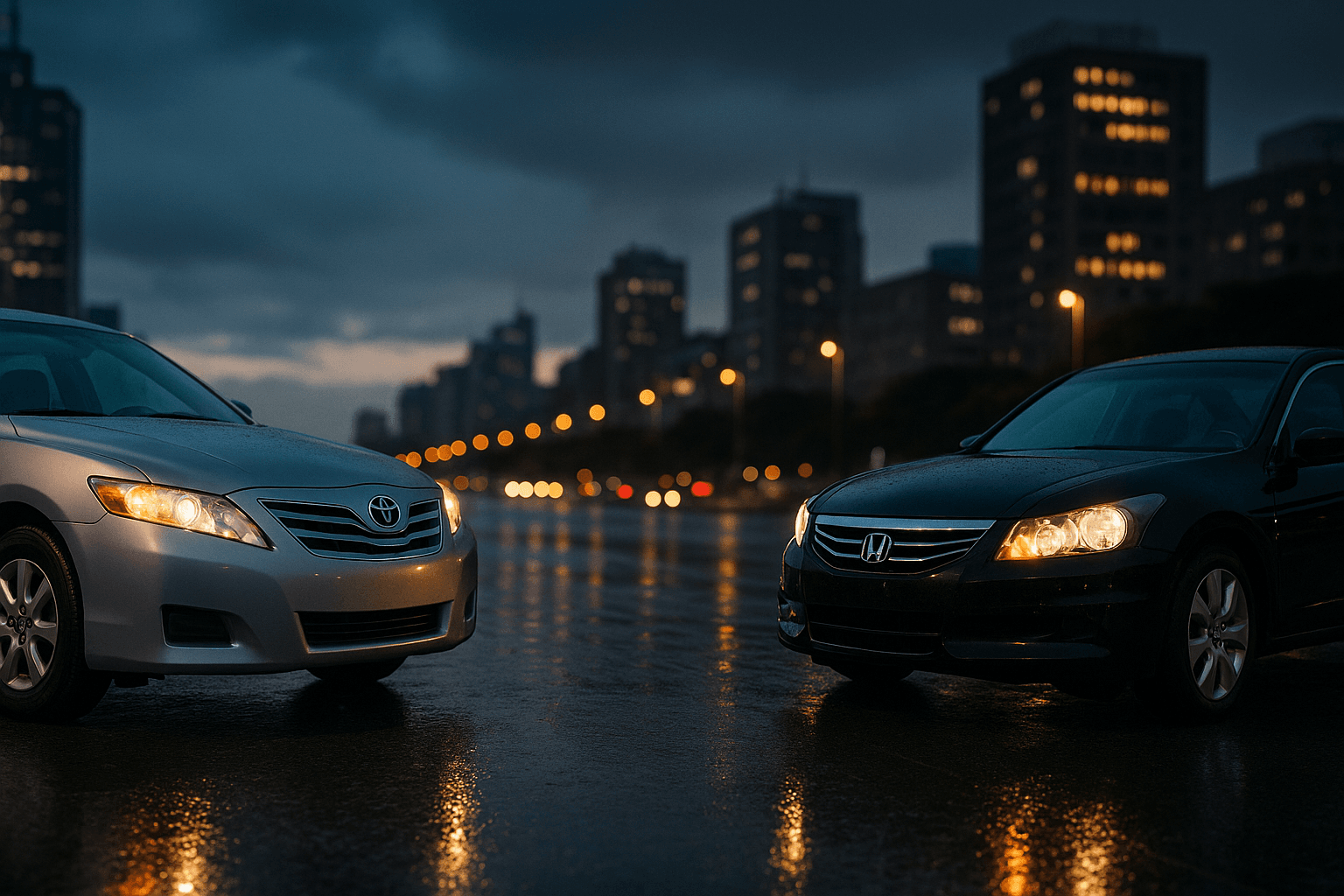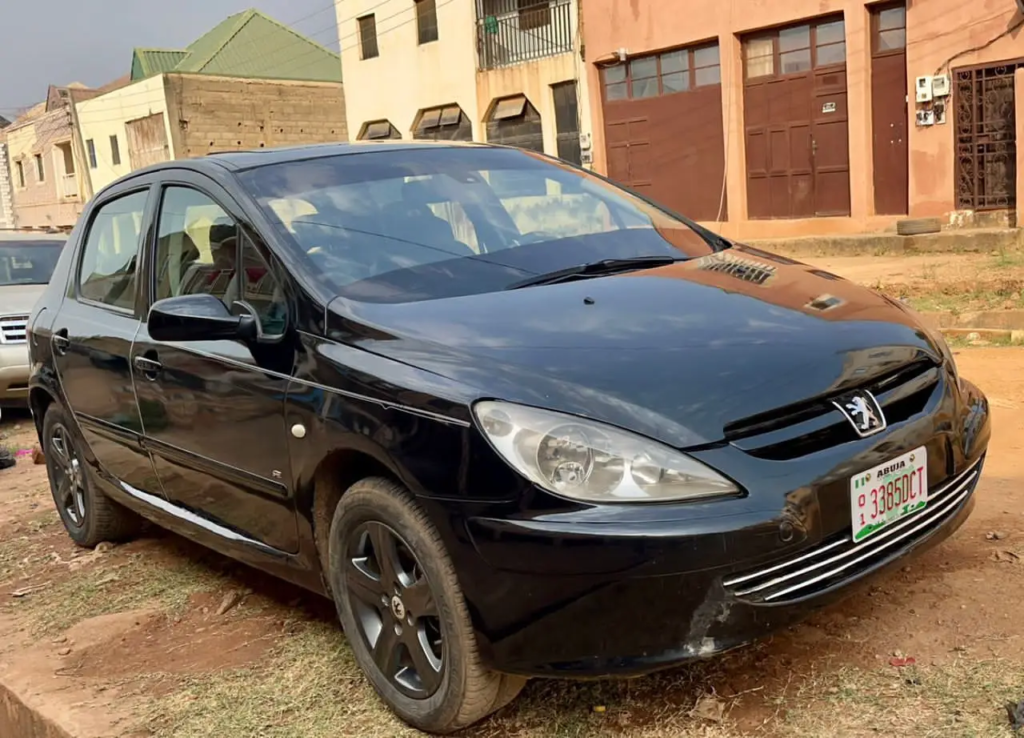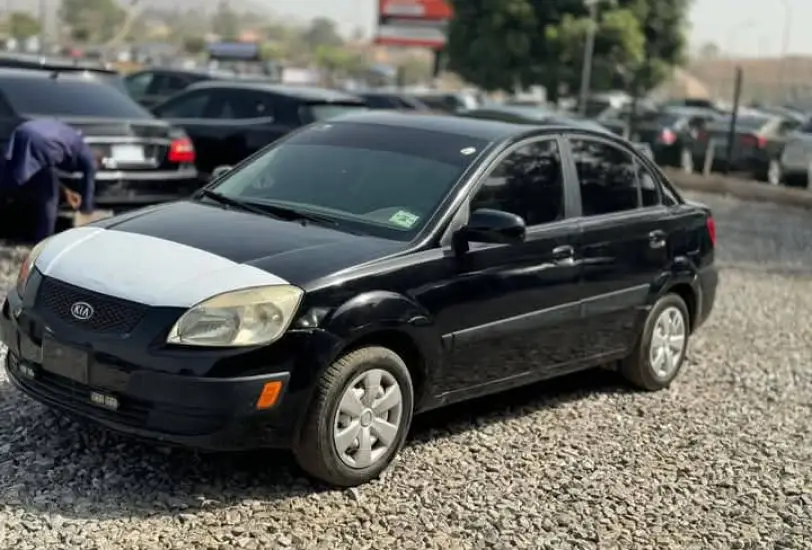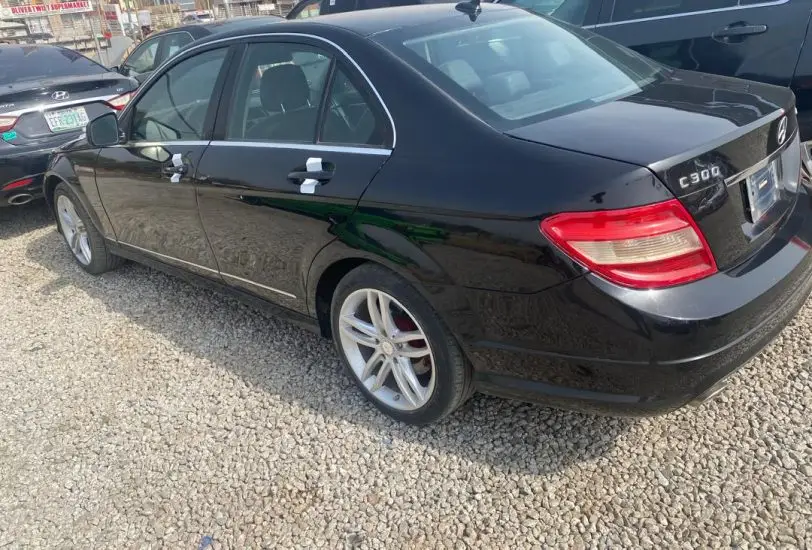On the bustling roads of Nigeria, from the sprawling highways of Abuja to the legendary traffic of Lagos, a silent battle has raged for decades.
It’s a debate that has occurred in countless homes, offices, and mechanic workshops: Toyota Camry or Honda Accord? This isn’t just a choice between two cars; for many, it’s a declaration of automotive philosophy.
Do you stand with the unshakeable reliability and comfort of the Camry, or do you pledge allegiance to the sporty, driver-focused spirit of the Accord?
Choosing your Tokunbo sedan is one of the most significant investments you’ll make. You’re looking for a partner on the road—a vehicle that can handle the daily grind, survive the weekend road trips, and not drain your bank account with endless “wahala.”
The sheer popularity of these two Japanese titans means you have plenty of options, but it also makes the choice that much harder.
This is your ultimate, no-nonsense guide to settling the debate for yourself. We are going to dissect every aspect of the Camry vs. Accord rivalry in the specific context of the Nigerian market.
We will use data-driven insights and real-world experience to compare their performance, maintenance costs, reliability, fuel economy, and even the stories behind their famous local nicknames. This is the only resource you will need to make a confident and informed decision. For an even deeper dive into any specific topic, you’ll find links to our dedicated expert articles throughout this guide.
Key Takeaways
- For Ultimate Reliability & Resale Value, Choose Camry: The Toyota Camry’s reputation in Nigeria is built on its rock-solid reliability and its ability to hold value better than almost any other car in its class. It is widely considered the safest long-term investment in the sedan category.
- For a More Engaging Drive, Choose Accord: If your priority is the driving experience itself—sharper handling, more responsive performance, and a sportier feel—the Honda Accord has consistently been the driver’s choice without making a major compromise on core reliability.
- Toyota is Generally Cheaper to Maintain: While both cars are affordable to run, Toyota Camry parts are typically more abundant and slightly less expensive in the Nigerian market due to their sheer volume, giving it a slight edge in long-term running costs.
- Know the Nigerian Nicknames: Understanding the local market language is crucial. Knowing the difference between a “Camry Muscle,” a “Big Daddy,” a Honda “EOD,” and an “Evil Spirit” is essential for identifying the correct model year and its specific reputation when shopping.
- The Final Verdict is Personal: There is no single “best” car between the two. The right choice depends entirely on what you value most: the Camry’s predictable comfort and financial security or the Accord’s dynamic driving pleasure.
The Contenders: An Introduction
The Reigning King: The Toyota Camry
In Nigeria, the Toyota Camry is more than just a car; it’s an institution. It is the default choice for individuals, families, and corporate fleets for one simple reason: a legendary reputation for bulletproof reliability. The Camry is the car you buy when you want absolute peace of mind.
It’s known for its plush, comfortable ride that soaks up the imperfections of Nigerian roads, its spacious interior, and—perhaps most importantly—its incredibly strong resale value. A well-maintained Tokunbo Camry is not just a car; it’s a liquid asset.
For a complete history and model-by-model breakdown, read our Toyota Camry Deep Dive.
The Sporty Challenger: The Honda Accord
If the Camry is the sensible, reliable choice, the Honda Accord is the one you choose with your heart. For decades, the Accord has been the go-to for drivers who want more than just a comfortable commute.
It has consistently offered sharper handling, more responsive steering, and more powerful V6 engine options that deliver a truly engaging driving experience.
Its design is often considered more aggressive and youthful, making it a favorite among those who believe a practical sedan doesn’t have to be boring.
To explore every aspect of this model, see our Honda Accord Deep Dive.
Understanding the Lingo: A Guide to Nigerian Car Nicknames
In Nigeria, we don’t just drive cars; we give them identities.
The nicknames bestowed upon different generations of the Camry and Accord are a unique part of our automotive culture, and understanding them is essential when navigating the Tokunbo market.
Decoding Camry Nicknames
The Camry’s nicknames often reflect its design evolution. Knowing them helps you pinpoint the exact year and model you’re looking at.
- Pencil Light (1997-2001): Known for its slim, “pencil-like” tail lights. A testament to Toyota’s longevity, these are still seen on the road but are now quite old for a Tokunbo purchase.
- Big for Nothing / Big Daddy (2002-2006): This generation was significantly larger than its predecessor, earning it these affectionate (and sometimes critical) names. It’s known for its spaciousness and durability.
- Muscle / OROBO (2007-2011): This is arguably one of the most popular Tokunbo models. Its muscular, more rounded, and substantial (“Orobo”) appearance marked a significant design shift. It’s famous for its V6 engine option and robust build.
- Spider (2010-2012 Facelift): A facelift of the “Muscle” generation, the “Spider” nickname comes from its redesigned headlights that some say resemble spider eyes.
- Latest (2018+): While not a single nickname, any Camry from 2018 onwards is often just referred to as the “latest shape,” known for its aggressive styling and modern technology.
Learn the full story behind every name in our Decoding Toyota Camry Nicknames.
Decoding Accord Nicknames
The Accord’s nicknames often reflect the passionate debates they sparked among car lovers.
- EOD – “End of Discussion” (2003-2007): This generation was so popular and well-regarded for its reliability and strong V6 engine that fans declared it the “End of Discussion” on which car was best.
- “Discussion Continues” (2008-2012): The successor to the EOD, this model was larger and more imposing. Its name reflects the ongoing debate about whether it truly surpassed its legendary predecessor.
- “Evil Spirit” (2013-2017): This model earned its intimidating nickname due to its aggressive, squinting LED headlights that gave it a menacing look on the road, especially at night. It’s known for its modern features and fuel-efficient Earth Dreams engines.
Uncover the history of these famous models in our Decoding Honda Accord Nicknames.
The Head-to-Head Showdown: Performance and Practicality
This is where the core differences between the two cars become clear. While both are excellent sedans, they cater to slightly different priorities.
| Feature | Toyota Camry | Honda Accord | The Expert Take |
| Ride & Handling | Softer suspension, prioritized for comfort. It glides over bumps smoothly, making it ideal for rough roads. | Firmer suspension, prioritized for driver engagement. It feels more connected to the road with sharper, more responsive steering. | Winner: Accord for the enthusiast, Winner: Camry for passengers and pure comfort. |
| Interior Space | Generally offers slightly more rear legroom and a more open, airy cabin feel. | Very spacious, but often with a more driver-focused cockpit design that can feel a bit snugger. | Winner: Camry for family-hauling and executive comfort. |
| Engine Philosophy | Engines are tuned for smoothness, quiet operation, and rock-solid reliability. | Engines, especially the VTEC variants, are known for being more responsive and delivering a more exciting powerband. | A matter of preference. Toyota prioritizes refinement; Honda prioritizes response. |
| Interior Quality | Traditionally uses durable, high-quality materials designed to last forever, though sometimes viewed as conservative. | Often praised for a more modern and stylish interior design, though some materials might not feel as “built-to-last” as the Camry’s. | Winner: Accord for modern design, Winner: Camry for perceived long-term durability. |
For a detailed, feature-by-feature comparison, see our Head-to-Head Comparison: Camry vs. Accord.
The Critical Cost Analysis: Which is Cheaper to Own?
Beyond the purchase price, the true cost of a car reveals itself over years of ownership. Here, we dissect the two most important financial factors for any Nigerian car owner: fuel and maintenance.
Fuel Economy Showdown
In an era of fluctuating fuel prices, every liter counts. Both the Camry and Accord are known for being fuel-efficient, but there are differences, especially between their 4-cylinder and V6 engine options.
Estimated Fuel Consumption (Combined City/Highway)
| Model (Popular Tokunbo Years) | Estimated Fuel Economy (L/100km) |
| Toyota Camry (2.4L/2.5L I4) | 9.0 – 10.5 L/100km |
| Toyota Camry (3.5L V6) | 11.0 – 13.0 L/100km |
| Honda Accord (2.4L I4) | 8.5 – 10.0 L/100km |
| Honda Accord (3.5L V6) | 10.5 – 12.5 L/100km |
Generally, the Honda Accord often has a slight edge in fuel economy, particularly with its 4-cylinder engines, thanks to its VTEC technology and often lighter build. However, the difference is usually marginal and can be easily offset by individual driving habits.
The introduction of hybrid technology has shifted the landscape, particularly for newer models. The Toyota Camry Hybrid, especially in its later iterations, generally demonstrates superior fuel efficiency compared to the Honda Accord Hybrid.
Get the detailed numbers in our Fuel Economy Showdown: Camry vs. Accord.
Common Faults & Long-Term Repair Costs
This is where the “Toyota tax” (or lack thereof) comes into play. While both cars are reliable, the cost and availability of parts can differ.
Maintenance Cost Comparison
| Factor | Toyota Camry | Honda Accord | The Expert Take |
| Parts Availability | Excellent: Parts are everywhere, from dealers to every corner of Ladipo market. Both OEM and Tokunbo parts are abundant. | Very Good: Parts are also widely available, but sometimes slightly less common for specific trim levels than the Camry. | Winner: Camry, by a slight margin. You can find a Camry part anywhere, anytime. |
| Parts Cost | Lower: Due to the sheer volume of cars and parts in the market, Camry parts are generally considered the cheapest to buy. | Low: Accord parts are also very affordable, but can sometimes be marginally more expensive than their direct Toyota equivalent. | Winner: Camry. The economies of scale make its parts incredibly cheap. |
| Common Issues | Some older V6 models (pre-2010) had reports of oil consumption at very high mileage. Dashboards on the “Muscle” generation could crack under intense sun. | Certain automatic transmissions in the mid-2000s (“EOD”) could be problematic if not maintained with genuine Honda fluid. | Both are exceptionally reliable, but knowing the specific model year’s quirks is key. |
For a deep dive into repair costs and reliability ratings, read our guide on Common Faults & Repair Costs (Camry vs. Accord).
The Smart Investment: Best Tokunbo Years to Buy
Not all model years are created equal. Buying the right year can get you modern features and bulletproof reliability, while buying the wrong one can lead to headaches.
- For the Toyota Camry: The 2012-2016 generation is often considered a “sweet spot.” It’s modern, incredibly reliable, and parts are everywhere. The older 2007-2011 “Muscle/Spider” is a fantastic budget-friendly choice, known for its robust build, but be extra vigilant about checking its maintenance history.
- For the Honda Accord: The 2013-2017 “Evil Spirit” generation is highly sought after. It marked a significant leap in technology and fuel efficiency. If you’re looking for a performance bargain, a well-maintained 2006-2007 “EOD” V6 is a legend, but a thorough transmission inspection is mandatory.
For a year-by-year analysis, see our Best Model Years to Buy.
The Smart Alternative: Is the Hyundai Sonata a Better Choice?
While Camry and Accord dominate the conversation, the savvy buyer should not overlook the Hyundai Sonata. For years, the Sonata has been the value-for-money disruptor in the sedan market.
- The Appeal: The primary reason to consider a Tokunbo Sonata, particularly from 2011 onwards, is style and features. You can often get a Sonata with features like a panoramic sunroof, a more advanced infotainment system, and a more daring design for significantly less money than a comparably-aged Camry or Accord.
- The Trade-Off: The traditional concerns with Hyundai have been a perceived lower reliability (though modern Sonatas are very well-built) and, more significantly, a lower resale value. However, if you plan to drive the car for many years and value features over future resale price, the Sonata presents an incredibly compelling argument.
Learn more about this strong contender in our Hyundai Sonata in Nigeria.
Conclusion: The Final Verdict – Which Sedan is Right for You?
After dissecting the data, the specs, and the real-world Nigerian context, there is no single “winner.” The best car is the one that best fits your priorities.
- Choose the Toyota Camry if: Your absolute top priority is bulletproof reliability, peace of mind, the lowest possible maintenance costs, and the best resale value in Nigeria. It is the sensible, logical, and financially prudent choice.
- Choose the Honda Accord if: You love to drive. If you value a more engaging and sporty experience, sharper handling, and don’t mind potentially slightly higher maintenance costs for a more exciting daily commute, the Accord is your champion.
- Consider the Hyundai Sonata if: You want the most style and modern features for your money. If you are a value-driven buyer who wants a car that looks and feels more expensive than it is, and you are less concerned about resale value, the Sonata is the smart alternative you cannot ignore.
The best way to make a final decision is to see them for yourself. At Autokunbo.com, we have a wide range of fully inspected Tokunbo Toyota Camrys, Honda Accords, and Hyundai Sonatas ready for you to explore. Find your perfect sedan today!







